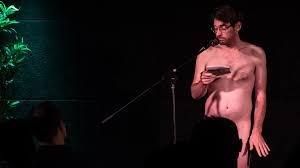Adam Smith in More Intelligent Life:
 Minutes before stepping out into the spotlight on a stage – totally naked – I am wondering whether to wear socks. “It’s cold,” shivers another performer. A friend counsels, “If you’re going out naked, do it in full.” The matter of the sock is a distraction from the fact that we’re about to show our willies to the masses. This might not be Wembley Arena, but the trendy basement bar in east London I’m performing in is packed with people – mainly men. Anticipation crackles among them. They giggle about picking seats with a good view of the stage. There are twice as many eyeballs as people. And each one of them is about to see all I have.
Minutes before stepping out into the spotlight on a stage – totally naked – I am wondering whether to wear socks. “It’s cold,” shivers another performer. A friend counsels, “If you’re going out naked, do it in full.” The matter of the sock is a distraction from the fact that we’re about to show our willies to the masses. This might not be Wembley Arena, but the trendy basement bar in east London I’m performing in is packed with people – mainly men. Anticipation crackles among them. They giggle about picking seats with a good view of the stage. There are twice as many eyeballs as people. And each one of them is about to see all I have.
You might wonder why I am about to go out on stage in the buff. As a child I hated my puppy fat. From the boy emerged a slimmer adult man, but he will never have washboard abs. Gay men like me are the freest we’ve ever been, but many of us still feel oppressed by the grids of hunks on Instagram and Grindr and the narrow ideal of male beauty they represent. A survey of 5,000 readers of Attitude magazine in 2017 found that 59% were either unhappy or very unhappy with their bodies. The problem is particularly acute with gay men. Three times as many gay or bisexual men have eating disorders as heterosexual men. And as I pull down my boxers in the green room, I can’t help but wonder how little Adam measures up. want to defy these feelings of inadequacy. That is why I find myself clutching my pages and jogging on the spot to get my energy levels up, preparing to deliver on the event’s mission: to help us celebrate our bodies. “Anyone who wants to be naked on stage can be,” says Justin Hunt, a co-founder of Naked Boys Reading. It is somewhat of a comfort to know that this event is by now an institution. Six years and hundreds of readings after this cheeky literary salon hosted its first event in a gay bar in east London, it is still serving up naked bodies every few months to a predominantly gay male crowd, in its effort to promote self-acceptance.
More here.
